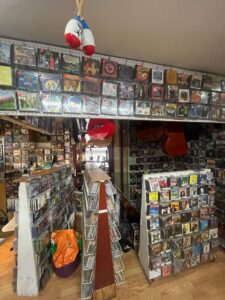You can hear Cholo’s Record Shop before you see it. Boleros, the kind that Cholo’s father used to play on the family turntable back in Puerto Rico, envelop E 148th Street from Brook to St. Ann’s Ave. The store overflows with Puerto Rican merchandise– Bomba y plena dresses; tee-shirts, sneakers, and duvet covers adorned with Puerto Rican flags; and guitars, timbales, and bongos crowd the front room.
But it’s what’s in the back that pulls most customers into Cholo’s.
Stacked from floor to ceiling are CD versions of just about every major salsa album ever recorded, plus a healthy selection of bachata, merengue, boogaloo, mambo, bolero and pachanga, among others. Cholo – born Guadalupe Gonzalez – has arranged his vast collection with the organizational rigor of a librarian, and he navigates it effortlessly. Looking for some old Cuban charanga? He’s stocked with Orquesta Aragon. Interested in exploring Venezuelan salsa? Check out the Oscar D’Leon section in the right corner. Remember the swagger and secret message quality of those 1970s Fania albums? He’s got an entire wall dedicated to the legendary New York label. On the exceedingly rare chance he doesn’t have what you seek, Cholo or his son Miguel, with whom he runs the store, will call their contacts “on the Island” and get the CDs sent over.
As a small child, “Cholo” got his nickname for his enthusiastic dancing to the song, “Que te parece, Cholito” by Benny Moré. He suspects it’s his passion for music that has kept his physical store afloat deep into the era of streaming: iTunes, Spotify, Apple Music. So many others have closed down around him. “You’re in the Bronx,” Cholo notes, “You have to have good music. You have to know about the music.”
Indeed, Cholo’s Record Store has survived two existential threats. For one, there’s the decline of the local salsa scene. In the New York that Cholo remembers in the ’70s and ’80s, there were always places to hear salsa bands live, and one could see legends like Tito Puente and Celia Cruz at clubs like Broadway 96. Now, Cholo lifts his shoulders and lets them drop, “Giuliani closed everything. All the musicians went to Puerto Rico, to Colombia. You don’t find clubs here anymore.”

Then there’s the obsolescence of CDs. When people carry their music in gigabytes, play it through earbuds and take recommendations from the almighty algorithm, what need is there for a CD store? Nevertheless, a steady stream, steady as a son clave beat, of both local and international customers continues to pour through Cholo’s doors. They are often pilgrims in search of the sounds from salsa’s heyday. “People come to me with the lists from Italy. They say, ‘You sure you have it?’– I have everything!”
Spotify might be convenient, but Cholo and Miguel maintain CDs sound better.
“You can hook up your phone to a stereo, it won’t sound the same as when you put on a CD,” said Miguel. And while platforms like Spotify and Apple music use elaborate predictive math to recommend new songs, they don’t have Cholo, who chats with customers and turns them on to his own favorites, exposing them to albums and artists deep in the vault of his knowledge.
Amanda Rosario, who lives in the building above the record shop with her mother, is emphatic about Cholo and his shop. “It’d be very different if he wasn’t around,” she notes. “He brings happiness and culture to the block,” and also to her mother, who “breakfast, lunch, and dinner, is gonna be there singing whatever song he’s playing.”

